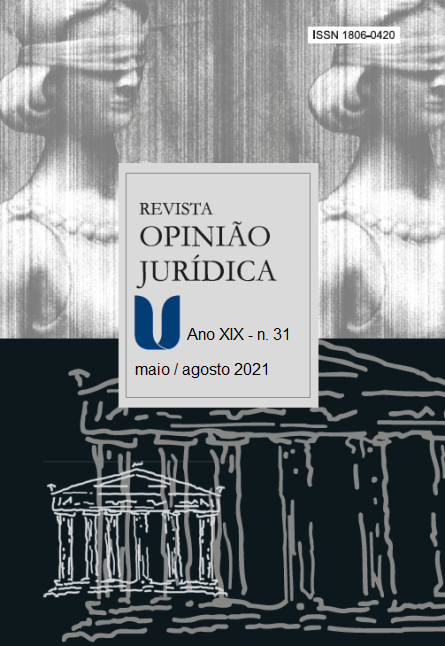THE USE OF VOTES CONFERRED TO INELIGIBLE CANDIDATES IN THE PROPORTIONAL SYSTEM: A PROPOSAL FOR INTERPRETATION ACCORDING TO THE CONSTITUTION OF THE SOLE PARAGRAPH OF ART. 16-A, LAW N. 9.504/97
DOI:
https://doi.org/10.12662/2447-6641oj.v19i31.p196-223.2021Keywords:
Principle of maximum use of votes in the proportional system, Democratic principle., IneligibilityAbstract
Objective: The democratic principle, the idea of popular sovereignty and the principle of maximum validity of votes are vectors that prevent the voter's expression of will in the ballot box from being completely ignored. Accordingly, votes cast in proportional elections for a candidate who has his candidacy registration rejected must, as a rule, be counted for his party or coalition. This general rule, however, must be adapted so that scams are not encouraged in the electoral process, allowing a well-known candidate who is patently ineligible to run for office only to enable the transfer of votes to the party and the coalition. In order to harmonize the requirement to preserve the voters’ will with the need to prevent fraud in the electoral process, it is necessary that the calculation, for the respective party or coalition, of the votes attributed to the candidate whose registration validity has not been decided on election day, be conditioned to the demonstration of good faith, measured according to objective parameters. In the event that there is no evident ineligibility and the decision to reject the registration issued by an appeals court is made after the deadline for substituting candidates, the voter’s will must be preserved.
Methodology: This study is based on the hypothetical-deductive method, by way of research of doctrine, legislation and jurisprudence, through the reading of books, scientific articles and legal diplomas that deal with the topic.
Results: The electoral system should work to ensure that the vote given to the candidate who appears in the ballot box is valid. Unfortunately, this is not what has happened in Brazil: voters choose their candidates, but they do not know if their vote will be canceled later due to the definitive recognition of some cause of ineligibility. It is often the complete annulment of votes attributed to candidates – in the proportional election – whose ineligibility (not manifest) was affirmed after the elections. In such cases, the general rule established by the ordinary legislator – which prevents the party from using votes – gives insufficient protection to democratic principles and popular sovereignty.
Contributions: The democratic regime imposes a goal (legislative and judicial) of maximum use of the vote, so that its total nullity should be exceptional, applicable as a ultima ratio, only when a situation of fraud to the formation of popular will is configured. This priority of preserving the vote conferred on the party in the proportional system imposes a heavy argumentative burden on the Judiciary in making the decision to completely invalidate the will expressed by the voter. It is necessary to offer very strong reasons to disregard the voter's choice to assign his vote to a given political party in the proportional system. Thus, the general rule of taking advantage of the vote conferred on the political party does not answer, definitively, the question of the destination of the vote received by ineligible candidates in the proportional system. It is necessary to recognize the competence of the electoral justice to weigh the peculiarities of each specific case in order to verify the presence or not of the attempted electoral fraud by submitting a candidacy known to be ineligible in order to distort the formation of the electoral will.
Published
How to Cite
Issue
Section
License
CESSION OF COPYRIGHTS
The submission of articles to analysis for publication on Opinião Jurídica implies the author(s) transfers copyrights to Centro Universitário Christus – UNICHRISTUS for reproduction, publicizing, distribution, printing and publication, according to the Publication Norm 414R, Opin. Jur., Fortaleza, year 12, n. 16, p.1-414, Jan./Dec. 2014, costs to be bore by UNICHRISTUS, in whatever format or means that may or shall exist, in accordance to articles 49 and following of Federal Law 9.610/98.
1. In ceding copyrights, the author(s) agrees to do so in exclusivity, free of charge and for the totality of the work.
2. UNICHRISTUS may make the work, in its entirety or in parts, available for scholarly purposes, without altering its contents, except for small corrections that are deemed necessary.
3. The cession of copyrights is valid in all countries and for versions of the material in its original language or translated into a foreign language.
RESPONSIBILITY FOR THE CONTENT
By submitting an article, the author(s) declare to have sole responsibility for the content of the piece and is(are), therefore, responsible for any judicial or extrajudicial measures referring to it.
1. In case of joint authorship, all authors are considered collectively responsible, except when proved otherwise.



















